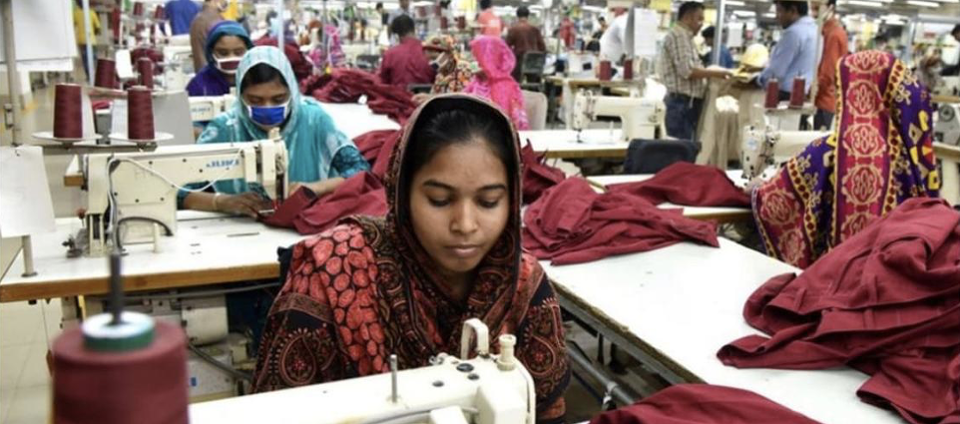Bangladesh’s New Generation Of Women-Led Labor Unions Confronts The Pandemic

Collected
What are you wearing? There’s a fairly good chance that the shirt on your own back or the pants in your closet were produced in Bangladesh, whose garment factories supply lots of the world’s most popular clothing brands and retailers-H&M, Zara, Gap, Walmart, and others. But as the New York Times recently pointed out, one early professional casualty of the coronavirus pandemic has been Bangladesh’s fast fashion manufacturing sector-a sector that makes up about 16% of the country’s GDP.
Now with Covid-19, the industry’s four million workers-most women-are seeing their lives upended, says Nazma Akhter, a union leader in Dhaka and founder of Awaj Foundation. She started working in Bangladesh’s garment factories when she was eleven years old. Over the decades she became a master negotiator and the architect of a new labor movement focused on supporting the industry’s workers.
Nazma, first, what does normal appear to be?
Girls and young women can be found in from the countryside to aid their own families. Their living conditions are incredibly poor. The essential wage is $95 dollars per month-they are paid once a month-and they work 10-12 hours each day, 7 days weekly. Low income and difficult conditions donate to a lot of problems in health insurance and nutrition. The ladies often fall sick and lose income. There aren’t many health services open to factory employees. A few factories offer daycare, however, not many. Sexual harassment is a major problem, too. Many become single mothers because they marry young and the husbands run away.
What progress perhaps you have seen?
We've succeeded in setting up unions in some of the factories, and things are better there. We've collective bargaining, and cooperation. For instance, we've sexual harassment committees with representation by women workers. These new types of unions are run by the ladies and are not involved in politics like in the old days. There are fewer strikes and clashes with police and we are looking for cooperative relationships. We understand that the factory owners have to make money, and the personnel want to help make the factories successful, but also safe places.
How have these last weeks been with the coronavirus?
Most brands have canceled or held or suspended their orders. A national lockdown of factories has been announced for just one month in March and April. Fearing they don't be paid for last month’s work, the personnel protested and were met with violence by police. The factories aren’t really set up to safeguard them from viral infection. One infected person can transmit to 100 others. So, everything is uncertain. Will the factories reopen? Will brands resume their orders? Will personnel be able to survive? Will Covid infections come to the factories?
Bangladesh is a small country with regards to land area, with 160 million people; it really is high density. And the garment industry is a high-density environment. There is a high risk. On top of disease, there may be the threat of unemployment. There aren’t many alternate jobs designed for young women. So as the pandemic is a worldwide issue, and a crucial moment for America, Europe, Asia, Australia, our women will go hungry. If indeed they don’t receive their back wages from March, they won’t have enough to eat. That is about survival.
In some very good news, we've exercised arrangements with two factories that have now paid workers for March and so are continuing to pay through factory closures which may have been extended through April 14th. Phone hotlines have been set up that workers can call if indeed they feel ill or need guidance. These efforts have been achieved through good faith efforts of management and workers during this very difficult time.
How can you stay strong, where do you draw inspiration?
I started in the garment sector when I was 11 years old, helping my mother. When I was 14 years old, I started organizing for my union and I faced a whole lot of challenges, a whole lot of difficulties. But my inspiration may be the other workers, my sisters and brothers. It’s not about my own life. That is about dignity and respect. The world talks about us as cheap labor, but we want the same things as anyone, fair treatment, safety, social security, insurance, protection.
A dire moment in Bangladesh, will there be anything we can desire to learn?
I am hopeful that people will start to see that people be based upon each other-the brands in Europe and America and the workers here. We need a common platform. It’s not about criticizing one another. We must prepare and solve problems together. We must study from this experience.
Source: https://www.forbes.com
Tags :
Previous Story
- 3 lakh may lose jobs in tourism sector
- Navigating the socioeconomic perils of Covid-19 in Bangladesh
- 'Game of Thrones' cold war between contractors plaguing...
- ‘Open MFS accounts for industry staff by April...
- Bangladesh urges global partners to honour conditions of...
- 546 factories, including 98 garments, textile units open
- Bangladesh's media sector congratulates Anadolu Agency
- BARVIDA, poultry sector hail PM’s stimulus package